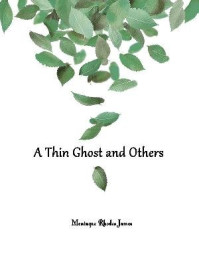




In one of the fairest of the West Indian islands a simple but elegant villa lifted its gabled roofs amidst a bewildering wealth of tropical beauty. Brilliant birds flitted among the foliage, gold and silver fishes darted to and fro in a large stone basin of a fountain which threw its glittering spray over the lawn in front of the house, and on the vine-shaded veranda hammocks hung temptingly, and low wicker chairs invited to repose.
Behind the jalousies of the library the owner of the villa sat at a desk, busily writing. He was a slight, delicate looking man, with an expression of careless good humor upon his face and an easy air of assurance according with the interior of the room which bespoke a cultured taste and the ability to gratify it. Books were everywhere, rare bits of china, curios and exquisitely tinted shells lay in picturesque confusion upon tables and wall brackets of native woods; soft silken draperies fell from the windows and partially screened from view a large alcove where microscopes of different sizes stood upon cabinets whose shelves were filled with a miscellaneous collection of rare plants and beautiful insects, specimens from the agate forest of Arizona, petrified remains from the 'Bad Lands' of Dakota, feathery fronded seaweed, skeletons of birds and strange wild creatures, and all the countless curiosities in which naturalists delight.
Lenox Hildreth when a young man, forced to flee from the rigors of the New England climate by reason of an inherited tendency to pulmonary disease, had chosen Barbadoes as his adopted country, and had never since revisited the land of his birth. From the first, fortune had smiled upon him, and when, some time after his marriage with the daughter of a wealthy planter, she had come into possession of all her father's estates, he had built the house which for fifteen years he had called home. When Evadne, their only daughter, was a little maiden of six, his wife had died, and for nine years father and child had been all the world to each other.
He finished writing at last with a sigh of relief, and folding the letter, together with one addressed to Evadne, he enclosed both in a large envelope which he sealed and addressed to Judge Hildreth, Marlborough, Mass. Then he leaned back in his chair, and, clasping his hands behind his head, looked fixedly at the picture of his fair young wife which hung above his desk.
"A bad job well done, Louise—or a good one. Our little lass isn't very well adapted to making her way among strangers, and the Bohemianism of this life is a poor preparation for the heavy respectability of a New England existence. Lawrence is a good fellow, but that wife of his always put me in mind of iced champagne, sparkling and cold." He sighed heavily, "Poor little Vad! It is a dreary outlook, but it seems my one resource. Lawrence is the only relative I have in the world.
"After all, I may be fighting windmills, and years hence may laugh at this morning's work as an example of the folly of yielding to unnecessary alarm. Danvers is getting childish. All physicians get to be old fogies, I fancy, a natural sequence to a life spent in hunting down germs I suppose. They grow to imagine them where none exist."
He rose, and strolled out on the veranda. As he did so, a negro, whose snow-white hair had earned for him from his master the sobriquet of Methusaleh, came towards the broad front steps. He was a grotesque image as he stood doffing a large palm-leaf hat, and Lenox Hildreth felt an irresistible inclination to laugh, and laughed accordingly. His morning's occupation had been one of the rare instances in which he had run counter to his inclinations. Sky blue cotton trousers showed two brown ankles before his feet hid themselves in a pair of clumsy shoes; a scarlet shirt, ornamented with large brass buttons and fastened at the throat with a cotton handkerchief of vivid corn color, was surmounted by an old nankeen coat, upon whose gaping elbows a careful wife had sewn patches of green cloth; his hands were encased in white cotton gloves three sizes too large, whose finger tips waved in the wind as their wearer flourished his palm-leaf headgear in deprecating obeisance.
"Well, Methusaleh, where are you off to now?" and Lenox Hildreth leaned against a flower wreathed pillar in lazy amusement.
"To camp-meetin', Mass Hildreff. I hez your permission, sah?" and the negro rolled his eyes with a ludicrous expression of humility.
His master laughed with the easy indulgence which made his servants impose upon him.
"You seem to have taken it, you rascal. It is rather late in the day to ask for permission when you and your store clothes are all ready for a start."
"'Scuse me, Mass Hildreff," with another deprecating wave of the palm-leaf hat, "but yer see I knowed yer wouldn't dissapint me of de priv'lege uv goin' ter camp-meetin' nohow."
Lenox Hildreth held his cigar between his slender fingers and watched the tiny wreaths of smoke as they circled about his head.
"So camp-meeting is a privilege, is it?" he said carelessly. "How much more good will it do you to go there than to stay at home and hoe my corn?"
The eyes were rolled up until only the whites were visible.
"Powerful sight more good, Mass Hildreff. De preacher's 'n uncommon relijus man, an' de 'speriences uv de bredren is mighty upliftin'. Yes, sah!"
"Well, see that they don't lift you up so high that you'll forget to come down again. I suppose you have an experience in common with the rest?"
"Yes, Mass Hildreff," and the palm-leaf made another gyration through the air. "I'se got a powerful 'sperience, sah."
"Well, off you go. It would be a pity to deprive the assembly of such an edifying specimen of sanctimoniousness."
"Yes, sah, I'se bery sanktimonyus. I'se 'bliged to you, sah."
With a last obsequious flourish the palm-leaf was restored to its resting-place upon the snowy wool, and the negro shambled away. When he had gone a few yards a sudden thought struck his master and he called,—
"Methusaleh, I say, Methusaleh!"
"Yes, sah," and the servant retraced his steps.
"What about that turkey of mine that you stole last week? You can't go to camp-meeting with that on your conscience. Come, now, better take off your finery and repent in sackcloth and ashes."
For an instant the negro was nonplused, then the palm-leaf was flourished grandiloquently, while its owner said in a voice of withering scorn,—
"Laws! Mass Hildreff, do yer spose I'se goin' ter neglec' de Lawd fer one lil' turkey?"
His master turned on his heel with a low laugh. "Of a piece with the whole of them!" he said bitterly. "Hypocrites and shams!"
"Evadne!" he exclaimed impetuously, as a slight girlish figure came towards him, "never say a single word that you do not mean nor express a sensation that you have not felt. It is the people who neglect this rule who play havoc with themselves and the world."
"Why, dearest, you frighten me!" and the girl slipped her hand through his arm with a low, sweet laugh. "I never saw you look so solemn before."
"Hypocrisy, Vad, is the meanest thing on earth! The pious people at the church yonder call me an unbeliever, but they've got themselves to thank for it. I may be a good-for-nothing but at least I will not preach what I do not practise."
"You are as good as gold, dearest. I won't have you say such horrid things! And you don't need to preach anything. I am sure no one in all the world could be happier than we."
Her father put his hand under her chin, and, lifting her face towards his, looked long and earnestly at the pure brow, about which the brown hair clustered in natural curls, the clear-cut nose, the laughing lips parted over a row of pearls, and the wonderful deep gray eyes.
" Are you happy, little one?" he asked wistfully. "Are you quite sure about that?"
"Happy!" the girl echoed the word with an incredulous smile. "Why, dearest, what has come to you? You never needed to ask me such a question before! Don't you know there isn't a girl in Barbadoes who has been so thoroughly spoiled, and has found the spoiling so sweet? Do I look more than usually mournful to-day that you should think I am pining away with grief?" She looked up at him with a roguish laugh.
He smiled and laid his finger caressingly on the dimpled chin. "Dear little bird!" he said tenderly; "but when this dimple captivates the heart of some one, Vad, you will fly away and leave the poor father in the empty nest."
Her color glowed softly through the olive skin. She threw her arms around his neck and laid her face against his breast. "You know better!" she exclaimed passionately. "You know I wouldn't leave you for all the 'some ones' in the world!"
Her father caught her close. "Poor little lass!" he said with a sigh.
The girl lifted her head and looked at him anxiously. "Dearest, what is the matter? I am sure you are not well! You have been sitting too long at that tiresome writing."
"Yes, that is it, darling," he said with a sudden change of tone. "Writing always does give me the blues. I think the man who invented the art should have been put in a pillory for the rest of his natural life. Blow your whistle for Sam to bring the horses and we will go for a ride along the beach."
Evadne lifted the golden whistle which hung at her girdle and blew the call which the well-trained servant understood. "Fi, dearest!" she said, "if there were no writing there would be no books, and what would become of our beautiful evenings then? But I am glad you do not have to write much, since it tires you so. What has it all been about, dear? Am I never to know?"
"Some day, perhaps, little Vad. But do not indulge in the besetting sin of your sex, or, like the mother of the race, you may find your apple choke you in the chewing."
Evadne shook her finger at him. "Naughty one! As if you were not three times as curious as I! And when it comes to waiting,—you should have named me Patience, sir!"
Her father laughed as he kissed her, then he tied on her hat, threw on his own, and hand-in-hand like two children they ran down the veranda steps to where the groom stood waiting with the horses.


